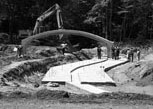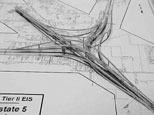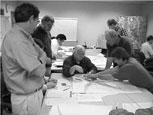U.S. Department of Transportation
Federal Highway Administration
1200 New Jersey Avenue, SE
Washington, DC 20590
202-366-4000
Focus
| Accelerating Infrastructure Innovations |
Publication Number: FHWA-RD-03-017
Date: May 2003
For more and more State highway agencies, value engineering (VE) is definitely value added. In 2002, highway agencies saved more than $1 billion by applying VE methods and techniques. Under the VE process, the highway agency reviews a project's features and looks for ways to improve quality, foster innovation, and lower life-cycle costs. A VE study typically takes 4-5 days to perform and involves a multidisciplinary team. At the concept stage, this team might include planning and right-of-way staff, private citizens, and environmentalists. If the study is done during the design phase, then the team might be composed of construction, design, traffic, and maintenance staff. The VE job plan usually features several different phases, including:
Although VE techniques have been employed by the highway industry for more than 3 decades, their use has greatly increased in recent years. A 1995 congressional regulation mandates the use of VE on all Federal-aid highway projects of $25 million or more. A growing number of States have also established their own VE programs, while the Federal Highway Administration (FHWA) has increased the amount of VE training and technical assistance it provides to States. This training includes a 4-5 day VE course for State highway agencies. The course provides an overview of the VE process, as well as the opportunity for course participants to split into teams and analyze actual highway projects in their State, using the VE principles they have learned. In many cases, States use the workshop studies after the course is over to make changes to projects and realize cost savings. "I think they often surprise themselves at the savings they find," says Donald Jackson, VE Coordinator for FHWA. This year, the course has been held in New Jersey, Oregon, Pennsylvania, and Puerto Rico.
States will have the opportunity to learn more about best practices for using VE and to share their own VE experiences at the 2003 American Association of State Highway and Transportation Officials (AASHTO) Value Engineering Conference, to be held July 15-18, 2003, in Tampa, Florida. The conference will feature three tracks: Case Studies, Starting and Maintaining a VE Program, and Advanced Tools and Techniques. "We've also worked in opportunities for networking, as there are not many venues where people can get together and share what they've learned about value engineering," says Conference Chairman Kurt Lieblong of the Florida Department of Transportation (DOT). The biennial FHWA Value Engineering Award will be presented at the conference. This award recognizes highway agencies for their exceptional accomplishments in applying and promoting an overall value engineering program. The conference will also feature the presentation of the AASHTO National Value Engineering Awards, which recognize outstanding VE projects.
 |  |
||
| Several VE recommendations have been implemented into the final design model for the Rt. 7 Wittpenn Moveable Bridge project in Hudson County, NJ, saving millions of dollars. | One of the VE recommendations implemented for a project on Rt. 133 Mercer County, NJ, was to build a precast concrete arch bridge in place of a conventional bridge with abutments and stringers. |
 |
 |
| The Washington State Department of Transportation typically performs one VE study a month. | |
Florida DOT started its VE program in 1978 and "it has been going strong ever since," says Lieblong. The agency normally performs between 50 and 55 VE studies a year, looking at all projects with a total cost of more than $20 million. Over the last 8 fiscal years, $1.3 billion in cost savings has been achieved through implementing approved VE recommendations. In fiscal years (FY) 2001/2002, the VE program realized a return on investment of $108 to $1. One study conducted in 2001/2002 was of the third segment of the widening of SR 7 in Broward County. This project is converting an existing five-lane undivided highway to a six-lane divided urban highway with three through lanes, a bike lane, curb and gutter, sidewalks, and a median curb in each direction. The cost for the third segment was estimated at $156.7 million. Recommendations made by the VE study team will reduce the cost by $31.1 million.
The Washington State Department of Transportation (WSDOT) began its VE program in the mid 1980s. After making some changes, the program was relaunched in the mid 1990s. Implementation of VE has increased since then, with typically one VE study performed a month. Projects selected for VE study are ones that cost more than $2 million or that involve complex factors, such as the building of an interchange. Last year, WSDOT saved $71 million by performing VE studies. In FY 2001, WSDOT instituted performance measures to track not only cost savings but additional benefits of the VE program. "If we achieve the performance measures, then the cost savings will follow," says Ken Smith of WSDOT. Performance is tracked for the following measures: VE recommendations implemented, improved constructibility, minimizing of right of way and/or environmental impacts, compressed development or construction schedule, enhanced operational performance, and development of partners and/or consensus building. In FY 2002, for example, 80 percent of VE recommendations were implemented, 55 percent of VE studies resulted in enhanced operational performance, and nearly 60 percent of the studies resulted in greater consensus building and development of partnerships.
|
Getting an Early Start on Value Engineering FHWA is now taking the VE message to high schools and universities. "We're trying to plant the seed early, making it easier for VE to become part of the state of the practice," says Donald Jackson, VE Coordinator at FHWA. Jackson met with a graduate class in construction management earlier this year at the University of Mississippi to discuss value engineering. Coming up are presentations at Louisiana State University and Prairie View A&M University. For more information, contact Donald Jackson at 202-366-4630 (fax: 202-366-3988; email: donald.jackson@fhwa.dot.gov). |
Four VE studies were performed over the last 4 years for a $1 billion road project in Spokane, including a concept study early during the development of the project and a constructibility study. The complex project involves building a four-level interchange in a high-density business and residential area. "The VE studies resulted in major changes to the interchange's alignment and design," says Smith. Ultimately, the VE recommendations accelerated the project delivery schedule and saved money. Members of the public and community groups also participated in the VE studies, resulting in greater acceptance and buy-in of the project.
New Jersey's VE program got underway in 1989. The DOT performs about 15 VE studies annually and averages well over $60 million a year in savings resulting from study recommendations. "We're achieving high quality projects as well," says Richard Jaffe of the New Jersey DOT. In selecting projects for VE study, the DOT looks for complex projects and those with a price tag of more than $5 million. New Jersey recently started evaluating not only construction costs but road user costs as part of its VE studies. "We're looking at how to quantify those road user costs and reduce user delays," says Jaffe.
For more information on VE, contact Donald Jackson at FHWA, 202-366-4630 (fax: 202-366-3988; email: donald.jackson@fhwa.dot.gov) or visit the FHWA VE Web site at www.fhwa.dot.gov/ve/index.htm. For State contacts, see sidebar. Information is also available on the AASHTO VE Task Force Web site (www.wsdot.wa.gov/eesc/design/aashtove). To learn more about the upcoming AASHTO Value Engineering Conference, contact Kurt Lieblong at Florida DOT, 850-414-4787 (fax: 850-414-4796; email: kurt.lieblong@dot.state.fl.us) or Ellen Sliger at Florida DOT, 850-414-4795 (fax: 850-414-4796; email: ellen.sliger@dot.state.fl.us). Information can also be found on the Web at www11.myflorida.com/qualityinitiativesoffice/projectmgmt/value.htm.
|
State Contacts Florida DOT Kurt Lieblong, 850-414-4787 (email: kurt.lieblong@dot.state.fl.us) New Jersey DOT Richard Jaffe, 609-530-5643 (email: richard.jaffe@dot.state.nj.us) Washington State DOT Ken Smith, 360-705-7253 (email: smithk@wsdot.wa.gov) |